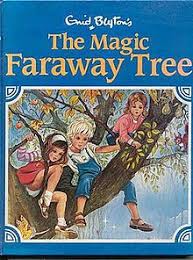Enid Blyton
Listen to the Recess! Clip
| Author | Malini Roy |
| Air Date | 11/18/2003 |

Enid Blyton Transcript
This month marks the anniversary of the creation of Noddy, the doll with a wobbly head who captured the hearts of children in many parts of the world over half a century ago. In November 1949 he appeared in Little Noddy Goes to Toyland, written by the British author Enid Blyton.
Mrs. Blyton wrote nearly 600 books for older children too. Among them are mystery and adventure series, like the Famous Five, the Secret Seven and the Five Find-Outers, and stories of boarding school life about the fictitious St. Clare’s and Malory Towers. Blyton wrote at an incredible pace, producing no less than 32 titles in 1950. One report even estimates that her books may be the most frequently translated works after after the Bible and Shakespeare.
Most of her works show a superb grasp of formula-writing and the dynamics of wish-fulfillment. Her exotic and lonely desert islands, buried treasure and deep, forbidding forests, all to be surveyed from a safe distance, offer a synesthetic extravaganza of sight, sound and smell. Fairies, pixies, elves and brownies are found within easy reach in the garden. Even Blyton’s realistic detective stories are full of animals who can think and act like humans, and the stories bank on the perennial desire of children to be one-up over the grown-ups. But probably Blyton’s trump-card was her inimitable descriptions of food — especially sumptuous high teas — in a bucolic Edwardian countryside. As a child in India, my friends and I were drawn to her books, like new generations of Indian children still are, precisely because of things like these foreign and exotic banquets. Growing up as we did in an urban, half-westernized environment, we envied the magical freedom that these kids had to go off anywhere and everywhere by themselves.
Although Blyton wrote most of her works during and after World War II, they depict England as though the grim realities of war had never existed. Perhaps it is this nostalgic throwback to another world that still makes her so popular in Commonwealth countries, erstwhile colonies of Britain, and non-English speaking countries of Europe. Half-forgotten in the country of her origin, Blyton’s works continue to be discussed and debated on radio programs in Germany, provide themes for Australian films, and get transformed into Bengali and Hindi comics in India. It is interesting to see how the richly imagined life of the white sahib from the imperial past continues to feed fantasies, even today.